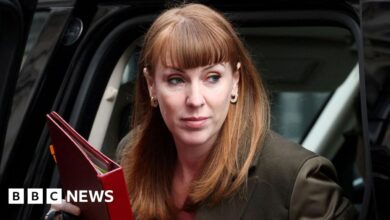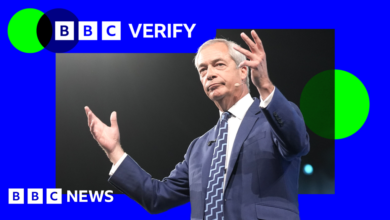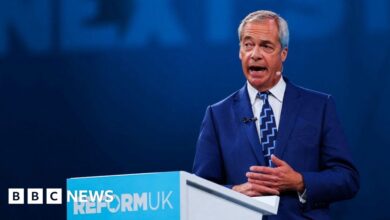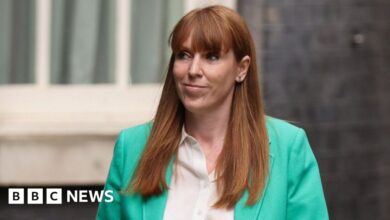Former Scottish First Minister Alex Salmond dies
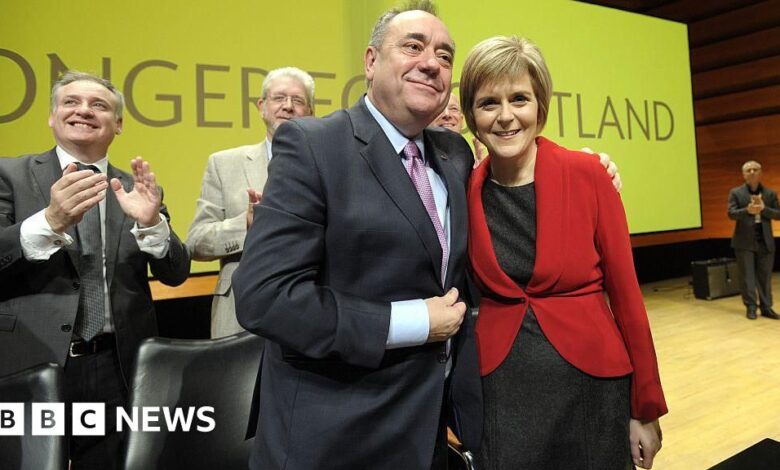
Scotland’s former First Minister Alex Salmond has died suddenly at the age of 69.
The former MP and MSP, who led the country between 2007 and 2014, became ill while attending an international conference in North Macedonia.
The North Macedonian government said Mr Salmond had lost consciousness at the Inex Olgica hotel, near the city of Ohrid, at about 15:30 local time on Saturday.
Local media reports said he collapsed during a lunch and was pronounced dead at the scene. The Alba party, which he led, believe the cause of death to be a heart attack, according to the Press Association news agency.
Tributes have poured in from across the political spectrum, with Prime Minister Sir Keir Starmer describing him as being a “monumental figure of Scottish and UK politics”.
Salmond’s succcessor as first minister, Nicola Sturgeon, said he had been her mentor and that “for more than a decade we formed one of the most successful partnerships in UK politics”.
King Charles said he and the Queen were “greatly saddened” to hear of Salmond’s sudden death, adding: “His devotion to Scotland drove his decades of public service
“We extend our deep condolences to his family and loved ones at this time”.
Salmond led the pro-independence side ahead of the referendum in 2014, and resigned as first minister after Scottish voters backed remaining in the UK by 55% to 45%.
He had led the SNP to power when they won the Scottish Parliament election in 2007, having previously been the party’s leader between 1990 and 2000.
Salmond, Scotland’s first pro-independence first minister, then led the SNP to an unprecedented majority in the election four years later – which paved the way for the referendum to be held.
Under his leadership, the Scottish government also introduced popular policies including free NHS prescriptions and free university tuition fees for Scottish students.
After quitting as first minister, he had a spectacular fallout with Sturgeon over her government’s mishandling of harassment complaints against him.
Salmond was also cleared of serious sexual offence charges after a trial in Edinburgh in 2020.
He had been charged with 13 offences, including attempted rape, but was acquitted of all of the charges against him after two weeks of evidence at the High Court.
The women who made the allegations against Salmond – which dated back to his time as first minister – had included an SNP politician, a party worker and several current and former Scottish government civil servants and officials.
During his evidence to the court, he said the claims made about his alleged conduct were “deliberate fabrications for a political purpose” or “exaggerations”.
In his closing speech to the jury, Salmond’s lawyer said the former first minister “could certainly have been a better man” but had not committed any crimes.
After quitting the SNP, Salmond set up an alternative independence supporting party, called Alba, of which he was the leader.
He also hosted his own show on the controversial Russian broadcaster RT, but suspended it following the invasion of Ukraine in 2022.
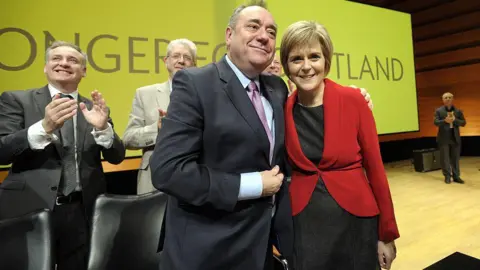 Getty Images
Getty ImagesAlba has approached the UK foreign office for help in returning Salmond’s body to the UK.
Its deputy leader Kenny MacAskill described Salmond as being “the outstanding Scottish politician not just of his generation but for generations far before” and said he had “possessed extraordinary charm and a common touch which endeared him to so many in Scotland”.
Paying tribute to her former political mentor, Sturgeon said she was “shocked and sorry” to learn of Salmond’s death.
She added: “Obviously, I cannot pretend that the events of the past few years which led to the breakdown of our relationship did not happen, and it would not be right for me to try.
“However, it remains the fact that for many years Alex was an incredibly significant figure in my life.
“He was my mentor, and for more than a decade we formed one of the most successful partnerships in UK politics.”
First Minister John Swinney said he was “deeply shocked and saddened” at the news and extended his condolences to Salmond’s wife Moira and his family.
Swinney added: “Alex worked tirelessly and fought fearlessly for the country that he loved and for her Independence.
“He took the Scottish National Party from the fringes of Scottish politics into government and led Scotland so close to becoming an independent country.”
Former First Minister Humza Yousaf said he and Salmond had “obviously had our differences in the last few years”, but praised the “enormous contribution he made to Scottish and UK politics”.
The Scottish Parliament has lowered its flags as a mark of respect to Salmond.
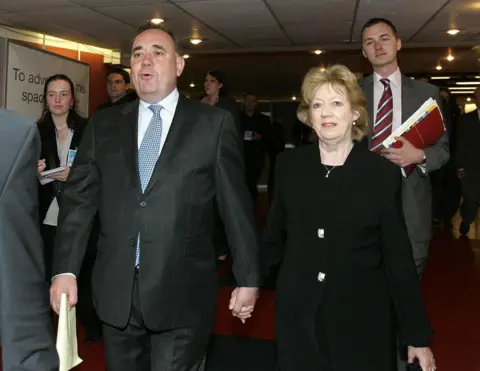 PA
PASalmond was born on Hogmanay 1954 in Linlithgow and went on to study economic and medieval history at the University of St Andrews, where he joined the SNP almost immediately after arriving in 1973.
He later worked as an assistant economist for the UK government’s Department of Agriculture and Fisheries for Scotland before moving on to the Royal Bank of Scotland, where he worked for seven years as an economist, eventually coming to specialise in oil and gas.
He served as the SNP MP for Banff and Buchan between 1987 and 2010 and was elected as party leader in 1990.
Salmond was elected to the Scottish Parliament when it was created in 1999, but stood down as party leader a year later before returning as leader in 2004.
Sir Keir Starmer described Salmond as being a “monumental figure of Scottish and UK politics”.
The prime minister added: “As first minister of Scotland he cared deeply about Scotland’s heritage, history and culture, as well as the communities he represented as MP and MSP over many years of service.
“My thoughts are with those who knew him, his family and his loved ones. On behalf of the UK government, I offer them our condolences today.”
Starmer’s predecessor as prime minister, Rishi Sunak, said: “Alex Salmond was a huge figure in our politics.
“While I disagreed with him on the constitutional question, there was no denying his skill in debate or his passion for politics. May he rest in peace.”


